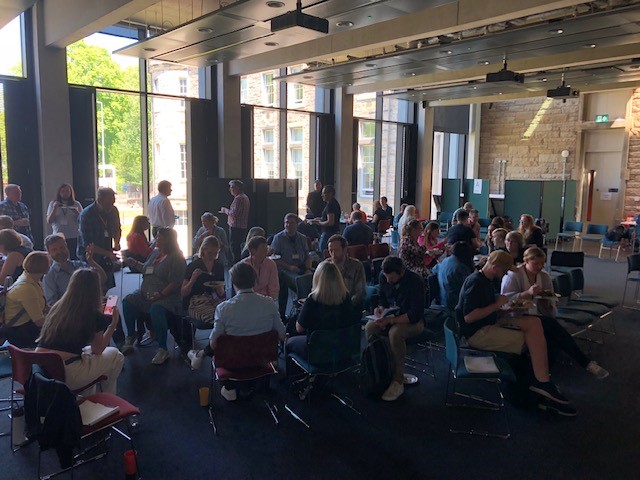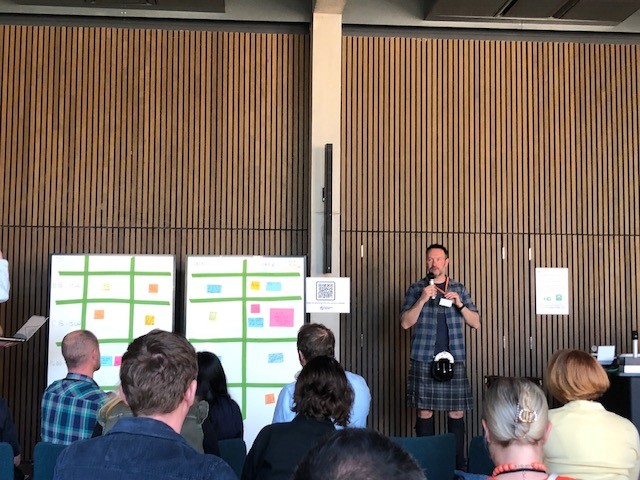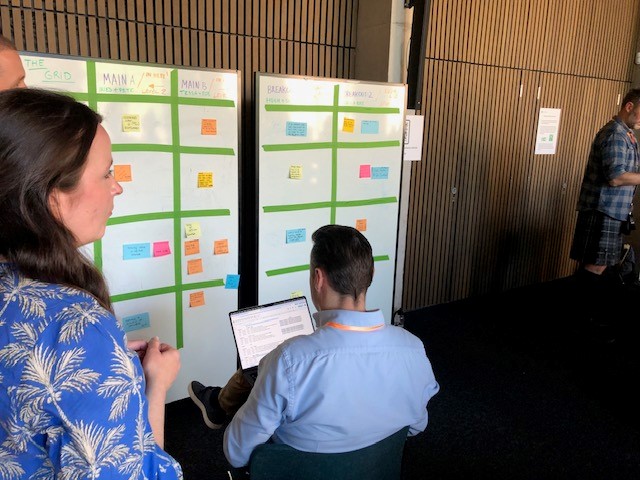GovCamp Scotland 2025 – reflections on a public sector unconference
I attended GovCamp Scotland last week, an unconference that brought together people in the public sector interested in building better services for people. It was a really positive experience with lots of discussion of challenges we face regardless of the organisations we work for. I left with new perspectives, new connections and a new reading list.
It’s been a while since I attended a GovCamp Scotland event. In fact my first unconference experience was organised by them.
My 2017 blog about attending GovCamp Scot
Since then I’ve been along to several higher-education focused unconferences, hosted a sector-wide meet up and next week will be running one for Edinburgh colleagues involved in student recruitment for the first time.
Sign up for our digital student recruitment unconference on 26 June 2025
More posts from the team about unconference experiences
So, safe to say I’m a fan of the format.
If you’re new to the idea of an unconference, check out our previous blog posts which do a good job of explaining.

The GovCamp Scotland unconference was a great opportunity for colleagues across the public and third sectors to come together for stimulating, self-directed discussion.
GovCamp Scotland 2025
Organised by volunteers and made possible through sponsorship, this year the event was taking place at the University’s Edinburgh Futures Institute.
GovCamp Scotland unconference 2025 website
The event brought together people from across Scotland’s public and third sector who had a shared interest in creating better services for people.
The range of organisations and professions was very wide. I talked with software developers, clinicians, digital skills training specialists, content designers, business analysts, service managers, fundraisers, user researchers and academics.
You might wonder how such a diverse range of people could find common ground on which to talk. But the reality is, if you want to build and improve services that work for people, you need a multidisciplinary approach and a common understanding that working iteratively and with end users is essential. Our common ground was, I think, human-centredness and beyond that people brought their experiences and expertise to a wide range of topics being discussed.

Ross Ferguson of co-organisers Public Digital was one of the group of volunteers who ensured the day went smoothly for everyone.

The programme for the day took shape quickly after delegrates made their proposals. These were typed up into a spreadsheet for ease of access across the day.
Session summaries and takeaways
There were 4 session slots across the day, each with 4 sessions to choose from.
I attended:
- Designing for people who experience trauma, stress and anxiety
- Skills development in the public sector – bringing the skills gap
- Access to technical skills and service in the third sector
- How we ensure the value of design is understood in the public sector?
Designing for people who experience trauma, stress and anxiety
This session was convened by a very experienced content designer who has contributed to a recent book on this topic.
Check out Design for Care – a book from Rosenfeld Media
We talked about how the impact of trauma, anxiety and stress affect how somebody interacts with a digital service.
It prompted reflections on my part about work we are doing at the moment to support the upcoming Clearing process which is a very stressful time for prospective students. But this paled almost into insignificance against the stories from others in the group about serving the needs of people with addiction issues and their families, and people from Ukraine displaced due to conflict.
We were able to connect though on matters such as our use of language – how policy makers and subject matter experts often want to work with terminology which, while accepted as the convention within an organisation or sector, did not reflect the terms used by the audience themselves.
The impact and importance of user research was something that shone through in pretty much every story people shared. We also talked about the value of interviewing people delivering services – proxy users – as in some circumstances user research with the service users themselves could be harmful to them.
While the conversation started around content design, it quickly moved into service design – considering the channels of engagement a service has with users and going where the people with the need feel most comfortable and safe.
I left this session with lots of thoughts about how our team might get closer to our end users through key services the University delivers. We do user research and usabilty testing regularly, but I think we could do more by regularly shadowing colleagues who are serving prospective students every day.
Skills development in the public sector – bringing the skills gap
This group talked about the range of approaches and initiatives (both past and present) that organisations had utilised to try and meet the challenge of attracting, upskilling and retaining staff with digital skills in the public and third sectors.
There was a common recognition that not enough entry-level positions existed and a general worry that the increase in the use of Artificial Intellengence (AI) technology was only going to compound this.
While the majority of the conversation was around the organisational-level challenge, there was talk about the challenge to the country as a whole. Scotland is a prominent educator on the world stage and part of our conversation considered the challenge of providing graduates with the right skills to transition into technical and design roles. There was a strong consensus that often a design degree wasn’t required to embark on a career in human-centred disciplines. Attitude and outlook are far more important.
Access to technical skills and service in the third sector
I partly chose this session because I’m a trustee of a local charity, and one of the things I bring is “technical skills”. I put that in speech marks because I don’t view myself as technical at all (mainly due to the talented people I work with that make me realise how little I know) but in the context of a group of trustees and volunteers I am one of the “tech experts”. Sustainability and continuity then are concerns and I was interested to hear the conversation here.
Plus, in a devolved university with a central IT function and systems that have been customised to accommodate a range of business needs, I thought there could be parallels to draw.
The session lead heads a service that provides technical operations to a range of charities that employ typically between 5 and 50 people.
One area of particularly interesting conversaton for me was around building processes for common problems that would enable a specialist to dip in and do a quick job for a team without the necessary skills. Examples that came up included:
- A data repository space in while an analyst could quickly spin up visualisations
- Website patterns that could be quickly repeated for common purposes – research groups and conferences or events came to mind
- A customer relationship management system approach for a common audience engagement scenario
In many ways, the challenges and opportunities that came up here mirrored the work we’ve been doing to deliver our new degree finder which is removing many of the historical needs schools have had for publishing prospective student content on their own sites.
How we ensure the value of design is understood in the public sector?
This was a session I was particularly keen to attend, as I wanted to get the perspectives of people facing the same challenges I have encountered regularly. There was a lot of reassurance for me in the sense that everyone had similar stories to tell across a range of organisations.
So part of the session was catharsis, absolutely. But it also exposed me to some new articles and ways of thinking that I want to dig into in the coming weeks.
Some reading recommended by people in the group:
Value-centred design
Erika Hall opens her UX London talk and accompanying article with ” …given what has been promised by human-centered design and where we are, designers as a group must be either incompetent, powerless, or delusional…”
Erika Hall on value-centred design – “Thinking in triplicate” on Medium
“Design operates in the potential space”
When you don’t achieve the potential you saw for a project, it’s important to reflect on how it would’ve been without you. A positive experience for collaborators and stakeholders can lead to a new starting point for the next project. It’s important to think about the longer term; where we’ll be in 5 years etc.
In particular, the concenpt of ‘wicked problems’ stood out for me. It’s a term I’ve heard used in the public sector design space but never dug into.
This is part of what Google AI search retrieved when I search on “Design operates in the potential space”:
“Wicked problems: Design problems are often ill-defined and complex, meaning there isn’t a single “best” solution, and the design space reflects this inherent uncertainty.”
Insufficient definition in a complex environment pretty much sums up my 20+ year career in professional services in higher education.
The business value of design
McKinsey’s 2018 report details four key clusters of design actions that showed the highest correlation with improved financial results. These are:
- Analytical leadership
- Cross-functional talent & collaboration
- Continuous & fast iterations with users
- User experience
It’s a report I think needs more promotion here at Edinburgh and in the higher education sector in general. I loved this quote, echoing as it does the “go and see” principle of Lean methodology, derived from Japanses manufacturing.
“Through personal exposure or constant engagement with researchers, executives can act as role models for their businesses and learn firsthand what most frustrates and excites customers.”
The business value of design – McKinsey consultants report from 2018
PDF version: The business value of design – McKinsey
Read more about unconferences
The Prospective Student Web Team have written more about attending and organising unconferences.
More posts about unconferences
Plus we are running one this week for Edinburgh colleagues involved in student recruitment.



